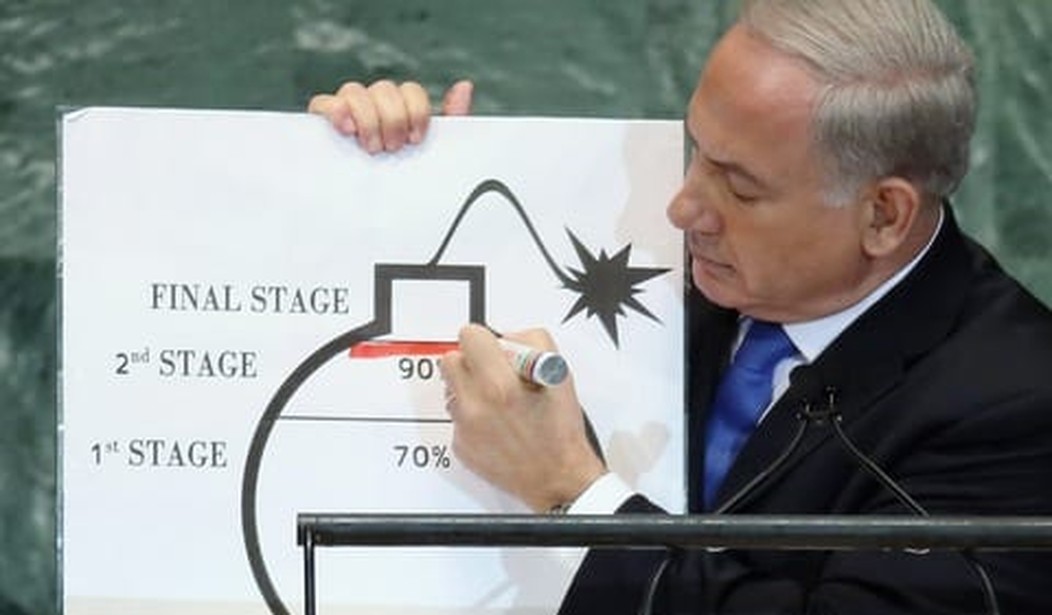WASHINGTON — The Treasury Department official in charge of implementing sanctions on rogue regimes was tripped up by the chairman of the Senate Foreign Relations Committee Tuesday when grilled on how quickly sanctions could even be restarted if the Iran nuclear deal falls through.
As expected, Undersecretary of State for Political Affairs Wendy Sherman, who has been leading the U.S. delegation in the Geneva negotiations, pressed the administration line that Congress moving forward on new sanctions would “derail” diplomacy, “alienate us from our allies and risk unraveling the international cohesion that has proven so essential to ensuring that our sanctions have the intended effect.”
“We have made it clear to Iran that if it fails to live up to its commitment, or if we are unable to reach agreement on a comprehensive solution, we would ask Congress to ramp up new sanctions immediately,” Sherman told the morning hearing.
Chairman Robert Menendez (D-N.J.), an author of the Iran sanctions bill that has raised such ire at 1600 Pennsylvania Ave., noted to Treasury Undersecretary for Terrorism and Financial Intelligence David Cohen that “all of the sanctions that I’ve offered with Senator [Mark] Kirk and members have supported, they always have to have at least a 6-month period of time in order to give countries and companies the notice required and the time for you to do the regulations necessary to proceed.”
When asked if that was a fair statement, Cohen stammered, “I — I assume so…”
“Well, you’re enforcing them and you’ve had to pursue them. Have you had less than six months to be able to pursue any of the sanctions that we’ve passed?” Menendez continued.
“Senator, I sitting here right now don’t recall every piece of legislation, whether any of them were immediately effective or there was a phase-in for all of them,” Cohen replied. “We have, of course, implemented the sanctions that Congress passes as promptly as possible.”
Menendez stressed that “the legislation that became law always had a very long lead time, and then after that, you went to work to try to pursue that,” undercutting the administration’s argument that sanctions could turn on and off like a spigot as needed.
“To suggest that we can quickly pass sanctions is to not recognize that when we pass sanctions, there are six months from the date of signing before it ever goes into effect, and then after that there’s a whole period of time for you actually to pursue enforcement,” he said. “…It’s not simply about passing sanctions. It’s about the timeframe necessary to have them be effective and ultimately to take effect. And that is way beyond the window.”
Menendez hadn’t spoken publicly about the Iran sanctions effort since President Obama scolded the bill’s supporters and vowed to veto any such bill in the State of the Union address.
Today, the senator made clear that he’s still in the game.
“Any deal the administration reaches with Iran must be verifiable, effective, and prevent Iran from ever developing even one nuclear weapon,” Menendez said. “In my view, based on the parameters described in the joint plan of action, and Iranian comments in the days that have followed, I am very concerned about Iran’s willingness to reach such an agreement. This is not a nothing ventured, nothing gained enterprise. We have placed our incredibly effective international sanctions regime on the line without clearly defining the parameters of what we expect in a final agreement.”
The chairman brought up a number of telling quotes offered by Iranian official in recent days, including the head of Iran’s nuclear agency, Ali Akbar Salehi, telling Iranian state television “the iceberg of sanctions are melting, while our centrifuges are also still working. This is our greatest achievement.”
“Well, frankly, it is my greatest fear. Salehi may be correct — the iceberg of sanctions may melt before we have an agreement in place. That may, in fact, be the Iranian end game.”
Any acceptable deal “must require Iran to dismantle large portions of its nuclear infrastructure. Any final deal must address Iran’s advanced centrifuge research and development activities that allow it to more quickly and more efficiently enrich uranium. It must eliminate the vast majority of Iran’s 20,000 centrifuges, close the Fordow facility, and stop the heavy water reactor at Arak from ever coming online. And it must address Iran’s weaponization activities at Parchin and possibly elsewhere, something not directly dealt with by the joint plan of action…. A final agreement should move back the timeline for breakout to beyond a year or more, and insist on a long-term, 20-year-plus regime of monitoring and verification.”
“A final agreement that mothballs Iran’s infrastructure, or fundamentally preserves their ability to easily break out, is not a final agreement I can support,” Menendez added.
Ranking Member Bob Corker (R-Tenn.) revived a legislative possibility raised by Menendez at a previous hearing, in which Congress would try to exert a stronger say over the final agreement.
“Maybe what Congress should do is pass a piece of legislation that lays out clearly the only thing we will accept at the end,” Corker said, highlighting the fear of many in Congress that the administration will just forge a series of never-ending rolling agreements.
Sherman claimed that, on the stated desire to keep Iran from obtaining a nuclear weapon, “I am certain that we are closer today to that goal than we were just a few weeks ago.”
“The P5+1’s negotiations with Iran underscores that it is possible not only to make progress on the nuclear issue, but with Iran,” she said. “The coming months will be a test of Iran’s intentions of the possibility of a peaceful resolution to the crisis.”
When Menendez asked for a yes-or-no answer on whether a final agreement would close Fordow, Sherman responded, “In all of these questions today, I’m going to be thoughtful about what I say, Senator, not because I do not want to be direct, but I don’t want to negotiate with Iran in public so that they know what our positions are going to be at the negotiating table. So I will be as forthcoming as I can be.”
She brushed off his question about the number of centrifuges Iran would need to remove and called President Hassan Rouhani’s claim that the agreement won’t call for any destruction of centrifuges “an opening maximalist negotiating position.”
Menendez noted another big flaw in the interim agreement: no access to Parchin, the military complex near Tehran believed to be ground zero for Iran’s nuclear weapons program.
“In the interim, in your joint plan of action, they rejected, during this period of time, access to it,” he said.
Sherman said it hadn’t been rejected, it just needed to be addressed. “I hope and I would urge Iran to address Parchin during these six months while we are negotiating the comprehensive agreement because it will increase the confidence that we will actually get to a final and comprehensive resolution,” she said.
Corker wanted to know why the interim agreement didn’t address delivery mechanisms. “I just don’t understand why an interim deal would not address them stopping the perfecting of those things that allow what they’ve already perfected to be delivered,” he said.
“If we are successful in assuring ourselves and the world community that Iran cannot obtain a nuclear weapon… then them not having a nuclear weapon makes delivery systems almost — not entirely — but almost irrelevant,” Sherman said.
“Why would you negotiate a deal that allows that to continue? I just, I don’t get it. Why would you say that would be a part of the next deal, since they’ve already perfected the first part? It seems to me that being able to deliver it is an important aspect, but apparently not so, in your case,” Corker said.
“Well, Senator, you and I disagree about the conclusion of the joint plan of action,” replied Sherman. “We believe that it has set out a framework for a comprehensive agreement to ensure that Iran does not obtain a nuclear weapon.”
Sen. Jim Risch (R-Idaho) noted that despite the administration’s claim that sanctions relief is limited, “you’ve got business people flooding in there ready to do business, going back to business as usual with the Iranians.”
“The French, the Italians, the Irish, the Canadians, you’ve got political people.… Whose job is it going to be to put the genie back in the bottle when this thing fails?” Risch asked.
“Although we don’t want people to go, because we think it does send the wrong message, if they do go, it puts pressure, perversely, on the Rouhani administration,” Sherman said of the new business traffic. “Because as far as we have seen today, there are not deals getting done, but rather people getting first in line in the hope that, someday, there will be a deal.”
In addition to Obama’s State of the Union warnings, pressure has also been lobbed at Democratic senators by Hillary Clinton as the White House battles the possibility of being embarrassed in front of the Iranian regime.
But the intensive behind-the-scenes effort against the Menendez-Kirk Nuclear Weapon Free Iran Act of 2013, which has 58 co-sponsors, has also gotten to some Republicans.
“I’ve not signed onto the new sanctions bill here. I believe that if diplomacy can work, we ought to allow it to work,” Sen. Jeff Flake (R-Ariz.) said.
“I haven’t appreciated some of the comments from the administration describing those who are in favor of a sanctions bill, implying that they’re warmongering or that they have anything but the best motives. I think that everyone here wants the same thing. And for the administration or others to describe people who have a different view, I think is unfair,” Flake added.
Proponents of sanctions likewise took umbrage at the administration’s attempt to paint pro-sanctions members as hellbent on attacking Iran in lieu of any negotiation process.
“I’ve been disappointed in the rhetoric from the administration about Congress’s involvement,” Corker said. “On one hand, I think that you would readily admit that the position that Congress has taken through the years has helped you be in the place that you are. But somehow, because Congress wants to ensure that we end up with a proper end state, there’s been a lot of unfortunate things that have been said.”
Furthermore, Corker added, the administration seems to be trying to use its battle with Congress as a red herring for the imminent failure of the deal.
“It’s sort of been a place where the administration can say, well, sanctions will end up keeping this deal from happening. Congress can keep saying, oh, we’re trying to do something about it. And I think it avoids the topic of you, candidly, clearly laying out to us what the end state is that you’re trying to negotiate,” he said.
“Maybe the administration can be enlightened to understand the difference between tactics and warmongering and fear-mongering,” Menendez said.









Join the conversation as a VIP Member